Related Research Articles

Shaolin kung fu, also called Shaolin Wushu, or Shaolin quan, is one of the oldest, largest, and most famous styles of wushu, or kung fu of Chan Buddhism. It combines Chan philosophy and martial arts. It was developed in the Shaolin Temple in Henan province, Greater China during its 1500-year history. Popular sayings in Chinese folklore related to this practice include "All martial arts under heaven originated from Shaolin" and "Shaolin kung fu is the best under heaven," indicating the influence of Shaolin kung fu among martial arts. The name Shaolin is also used as a brand for the so-called external styles of kung fu. Many styles in southern and northern China use the name Shaolin.
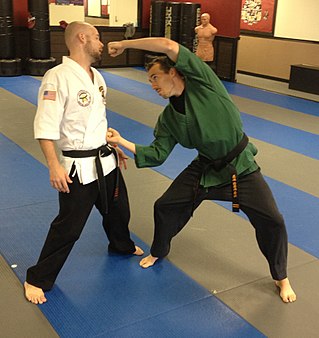
Kenpō is the name of several arts. The word kenpō is a Japanese translation of the Chinese word "quánfǎ" which literally just means "fist method" or "striking method". This term is often informally transliterated as "kempo", as a result of applying Traditional Hepburn romanization, but failing to use a macron to indicate the long vowel. The word Kenpō translates thus: "Ken" meaning 'Fist' and "Po" meaning 'Method' or 'Law' as in 'Law of gravity', a correct interpretation of the word Kenpō would be 'Fist Method', the same meaning as 'Quanfa'. However, it is often misinterpreted as 'the Law of the Fist'. The generic nature of the term combined with its widespread, cross-cultural adoption in the martial arts community has led to many divergent definitions.
Shorinji Kempo is a Japanese martial art claimed to be a modified version of Shaolin Kung Fu. The name Shōrinji Kempo is the Japanese reading of Shàolínsì Quánfǎ. It was established in 1947 by Doshin So [born Michiomi Nakano], a Japanese martial artist and former military intelligence agent who lived in China for many years before and during World War II.
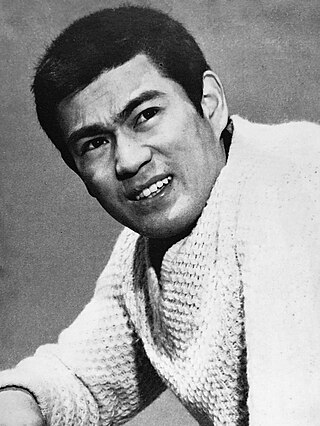
Shinichi Chiba, known internationally as Sonny Chiba, was a Japanese actor and martial artist. Chiba was one of the first actors to achieve stardom through his skills in martial arts, initially in Japan and later before an international audience.
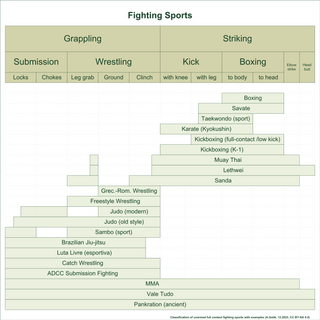
A combat sport, or fighting sport, is a contact sport that usually involves one-on-one combat. In many combat sports, a contestant wins by scoring more points than the opponent, submitting the opponent with a hold, disabling the opponent, or attacking the opponent in a specific or designated technique. Combat sports share a long history with the martial arts.
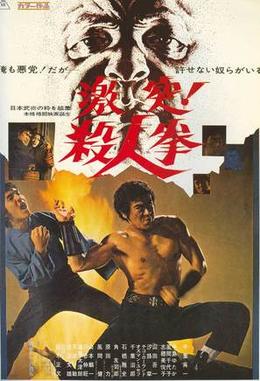
The Street Fighter, originally titled in Japan as Gekitotsu! Satsujin-ken, is a 1974 Japanese martial arts film produced by Toei Company, directed by Shigehiro Ozawa, and starring Sonny Chiba. It was released in the United States by New Line Cinema and became one of the first films to be a commercial success for the distributor. It is notable as the first film to receive an X-rating in the US solely for violence.
Ansatsuken is a Japanese neologism used frequently in fictional works to describe any martial art style or fighting technique that has been developed with the purpose of killing an opponent. The term satsujinken is used interchangeably as well and the homophonous term satsujinken is used when the martial art style or technique explicitly revolves around swordsmanship rather than barehanded combat.
Ryuchi Matsuda - born Masashi Matsuda - was a Japanese scholar of Chinese martial arts from Okazaki City, Aichi Prefecture. "Ryuchi" was his Dharma name when he was a Shingon priest of Toji Temple.

Nippon Kempo (日本拳法) is a Japanese martial art founded and created by Muneomi Sawayama in 1932. Sawayama was a judoka who had studied under Kenwa Mabuni, a karateka who would establish the Shito-Ryu school of Karate. There are multiple schools and groups based on the Nippon Kempo Association launched by Sawayama, and each has its own rules. It is typically practised wearing protective gear and gloves and allows full use of stand-up striking, throwing, and ground fighting.

Sister Street Fighter, original titled in Japan as On'na Hissatsu-ken, also released in the United Kingdom as Revenge of the Dragon, also released in Germany as Die Karate Tiger is a spin-off of The Street Fighter (1974). The plot revolves around Lǐ Hóng-Lóng, the female martial artist of the title. When her brother Lǐ Wàn-Qīng is kidnapped by drug lords, she seeks revenge. The drug lord's colorful collection of "killers" includes a toga-clad group of Thai Boxers called the "Amazons Seven", along with representatives of almost every martial art. Hóng-Lóng breaks into the drug lord's compound with the help of Seiichi Hibiki and other members of the Shorinji Kempo dojo. After all of his minions are defeated, the drug lord himself battles Hóng-Lóng, wearing a steel claw in imitation of Han, the villain from Enter the Dragon (1973). This was the first in a trilogy of films. It was followed by Sister Street Fighter: Hanging by a Thread (1974) and The Return of the Sister Street Fighter (1975), each with Shihomi as star.

Etsuko Shihomi, now known by her married name Etsuko Nagabuchi, is a Japanese actress who appeared in several Japanese martial arts films and samurai film and TV productions of the 1970s and 1980s.

When Taekwondo Strikes is a 1973 Hong Kong martial arts film directed and written by Feng Huang, and produced by Raymond Chow. The film is known for the collective martial arts experience of its cast and the high-quality fight choreography. The film stars an international cast of martial arts film actors, including Angela Mao, Jhoon Rhee, Anne Winton, Wong In Sik, Carter Wong, Kenji Kazama, Sammo Hung, Biao Yuen, and Golden Harvest producer Andre Morgan. This was Jhoon Rhee's only film, and Anne Winton's debut film.

Doshin So, (1911–1980) was a Japanese soldier and martial artist. He is most known as the creator and founder of Shorinji Kempo and the doctrine Kongo Zen. Practitioners of Shorinji Kempo refer to him as Kaiso, Japanese for "the founder".
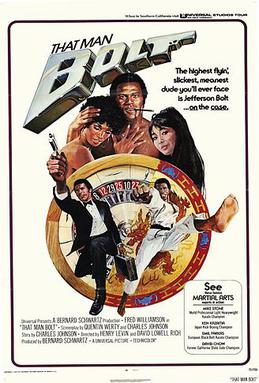
That Man Bolt is a 1973 American action film directed by David Lowell Rich and Henry Levin. It stars Fred Williamson in the title role of a courier and Byron Webster. The film combined several genres: blaxploitation, the martial arts film, and James Bond superspy films. It was filmed in Hong Kong, Macau and the United States and featured several martial arts experts in action: Mike Stone, World Professional Light Heavyweight Karate Champion, Kenji Kazama Japan Kickboxing Champion, Emil Farkas, European Black Belt Karate Champion, and David Chow, Former California State Judo Champion. It was titled Operation Hong Kong outside the United States. Peter Crowcroft wrote the novelization of the screenplay.

Shaolin Kenpo Karate is a martial art style that combines the Five Animals of Shaolin Kung Fu (Shaolinquan), the core competency of Kempo, the hard-hitting linear explosiveness of traditional Karate, as well as the power of Western boxing and the felling and grappling arts of Jujutsu, Chin Na, and Mongolian wrestling. This system was founded and developed by Fredrick J. Villari, who devised a hybrid system which integrated the four ways of fighting: striking, kicking, felling, and grappling to eliminate the inherent weakness of martial arts systems that focus on just one or two of fighting techniques.

The Byakuren Kaikan or Byakuren Karate is a full contact karate style founded in 1984 by Sugihara Masayasu.
Andre Morgan is an American film and movie producer and financial consultant.
Anne Winton was an American ballerina, martial artist and film actress. Hailing from Brewster County, Texas, she starred in two films during the 1970s. Her first film was When Taekwondo Strikes (1973), which she co-starred in. She was the first Caucasian female martial artist to star in an Asian film production. Her second film was Bruce Lee: A Dragon Story (1974), opposite Bruce Li. She was murdered in 1982.

Bōgutsuki Karate is one of the competition formats of Karate. It is also known as bōgu karate, bōgu-tsuki shiai (防具付試合), bōgu-tsuki kumite.
Hajime Kaburagi was a Japanese music composer. His another name was Tsukimi Satoichita. Kaburagi is best known as a composer of hit song Ginza no Koi no Monogatari which was sung by Yūjirō Ishihara and Junko Makimura.
References
- ↑ Japan-Africa Economic and Culture Association - KIREN BUSHINDO Pages 1 and 2
- ↑ Letterboxd - When Taekwondo Strikes 1973 ‘跆拳震九州’ Directed by Wong Fung
- ↑ British Film Institute - WHEN TAEKWONDO STRIKES (1973), Cast & Credits
- ↑ Movieo.me - When Taekwondo Strikes
- ↑ Kung Fu Movie Guide, July 23, 2016 - When Taekwondo Strikes (1973) by Ben Johnson
- ↑ Letterboxd - When Taekwondo Strikes 1973 ‘跆拳震九州’ Directed by Wong Fung
- ↑ Black action films: Plots, Critiques, Casts and Credits for 235 Theatrical and made-for-Television Releases, By James Robert Parish, George H. Hill - Page 304
- ↑ Classic Movie Fight Scenes: 75 Years of Bare Knuckle Brawls, 1914-1989, By Gene Freese - Page 225 FRED WILLIAMSON vs. KEN KAZAMA in That Man Bolt (1973)
- ↑ Blaxploitation Films, By Mikel J Koven - That Man Bolt (1973), Background Information
- ↑ Far East Films, June 15, 2015 - The Street Fighter, ACTION
- ↑ Kung Fu Movie Guide, January 22, 2013 - The Street Fighter (1974) by Ben Johnson
- ↑ WorldCat - Return of the Street Fighter = Satsujin ken 2 Details, All Authors / Contributors:
- ↑ HKMDB - Karate from Shaolin Temple (1976)
- ↑ Letterboxd - Karate from Shaolin Temple 1976 ‘少林寺拳法 ムサシ香港に現わる’ Directed by Hideo Nanbu
- ↑ Discogs - Ken Kazama* – Forever Bruce Lee
- ↑ 45Cat - Ken Kazama - Discography
- ↑ Imdb - Ken Kazama